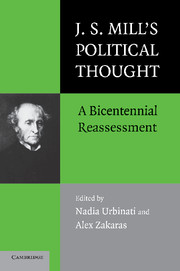Book contents
- Frontmatter
- Contents
- List of Contributors
- Introduction
- PART ONE LIBERTY AND ITS LIMITS
- PART TWO DEMOCRACY AND THE INDIVIDUAL
- PART THREE BEYOND NATIONAL BORDERS
- 11 Cosmopolitan Patriotism in J. S. Mill's Political Thought and Activism
- 12 Mill and the Imperial Predicament
- 13 Making Sense of Liberal Imperialism
- 14 Mill's “A Few Words on Non-Intervention”: A Commentary
- Bibliography
- Index
13 - Making Sense of Liberal Imperialism
Published online by Cambridge University Press: 08 January 2010
- Frontmatter
- Contents
- List of Contributors
- Introduction
- PART ONE LIBERTY AND ITS LIMITS
- PART TWO DEMOCRACY AND THE INDIVIDUAL
- PART THREE BEYOND NATIONAL BORDERS
- 11 Cosmopolitan Patriotism in J. S. Mill's Political Thought and Activism
- 12 Mill and the Imperial Predicament
- 13 Making Sense of Liberal Imperialism
- 14 Mill's “A Few Words on Non-Intervention”: A Commentary
- Bibliography
- Index
Summary
Can a militarily irresistible foreign power help establish a lastingly democratic form of government in a country with no history of democracy? That a powerful military can more easily oust a dictator than erect a democracy has been demonstrated, if it needed demonstrating, by the U.S. invasion of Iraq. But one misbegotten experiment should not be allowed to disgrace and discredit the very possibility of democracy promotion in a previously undemocratic country by a foreign and therefore, by definition, undemocratic power. That is why it may be worthwhile to reinterrogate John Stuart Mill. Did the greatest nineteenth-century theorist of social improvement and liberal democracy believe that foreign rulers could foist this particular forward step on what he called “backward populations” (CW XIX: 568)? Why would foreign powers try? Is it rational for them to undertake such a project? Can there be too much democracy from their point of view? What are the principal reasons why foreign democratizers may fail?
In his general discussions of democratization, whether homegrown or imposed, Mill tried to occupy a middle position between voluntarism and fatalism. Liberal democracy has specific preconditions and cannot be established, at the crack of a whip, anywhere anytime. On the other hand, originally absent but essential preconditions of liberal democracy can themselves, at least occasionally, be conjured, intentionally as well as inadvertently, out of existing raw materials. This is why Mill repudiates determinism, concluding emphatically that “institutions and forms of government are a matter of choice” (CW XIX: 380).
- Type
- Chapter
- Information
- J.S. Mill's Political ThoughtA Bicentennial Reassessment, pp. 319 - 346Publisher: Cambridge University PressPrint publication year: 2007
- 9
- Cited by



